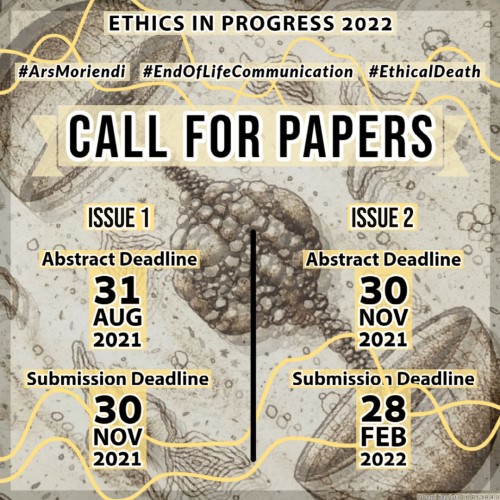Guest Editors: Alicja Dłużewicz M.A., Karolina Napiwodzka M.A., Sara Sgarlata B.A.
Ethics in Progress provides a cross-disciplinary & cross-cultural global forum for the examination and discussion of innovative research in ethics across disciplines. Ethics in Progress especially encourages submissions that use a range of empirical and experimental research methods. The journal addresses moral development, normative framework & its dynamics, and moral activism in context. A semi-annual journal which appears in a Spring-Autumn cycle. It encourages original submissions from all over the world.
Ethics in Progress invites submissions on the topic of Ars Moriendi (the art of dying), that is, how to go through the ultimate realities of life with dignity. A prodigious variety and disparate sorts of phenomena are encompassed by the poignant concept of death, and each of them leads to similarly complex and multifaceted interpretations of it. The heuristics of the end-of-life is a liminal one, not only because the subject itself, that is, picturing death and/or dying, is placed at the farthest frontiers of the imagination; but also because it urges breaking through disciplinary boundaries. Death Studies is nowadays a field of inquiry that, besides biomedicine, dips into anthropology, sociology, psychology, and thanatology. Yet, the way we cope with the very idea of finitude persists on a binary fluctuation between the promise of the afterlife offered by religion, on the one hand, and the indefinite prolongment of the actual life promoted by secularized medical practices, on the other. Although a bunch of cultural-symbolic, aesthetic, psycho-social and anthropological representations of death are produced by human communities, there is a general tendency in Western societies to fall back on reductive narrations and euphemisms, which conversely encourage the faith on an indefinite prolongment of life against the very idea of mortality.
Excessive medicalization and hyper-hygienic culture lead to an augmented sensitivity to the feelings of wellness and illness and increases the so-called worried well, that is, those people that seek for medical treatment even if they do not exhibit any concerning disease symptoms. The belief that medical treatment should always provide alleviation encourages malpractices in healthcare, conflicts, legal disputes, and distrust toward institutions. While the public expense for medications increases, patients are left bereft of self-determination and decisional power, while their stories, emotional well-being, preferences for treatments and dying modalities, and relationships with healthcare operators, are not included into the clinical decision-making processes.
This new volume mainly focuses on the philosophy of dying/death. The editors reserve the right to divide the submitted articles into two issues, intended to be published in such an order:
• Issue 1, on philosophical-anthropological themes related to the representations of death.
• Issue 2, on issues more closely related to bioethics and the ethics of care, as supplements to biomedical practices.
The following themes are suggested:
• The centrality of the body in the phenomenology of illness
• Funereal symbolism, or how the dead produces natural-cultural meanings
• Aestheticization and artistic picturing of death
• Semiotics of death, or how the language binds us to certain narratives of the dead, and its consequences
• Family bonds, continuity and legacy
• Death education for children and adults
• End-of-life communication
• Psychological support to the terminally (or chronically) diseased and their families
• Limits of and alternatives to conventional medicine in the context of terminal illness (e.g., palliative care)
• Death criteria (e.g., brain death) and their implication in clinical decision-making
• Is an ethical death possible – and how?
• Deepening normative concepts, such as the subject of care, autonomy, proportionality between benefits and burdens, conscious consent, and the best interest for incapable patients.
• Dilemmas in biomedical practices (e.g., conscientious objection)
Technical requirements
The editors kindly ask the authors to prepare three distinct working files (in OpenOffice or Word Format):
1. A preliminary abstract, previous to the final submission, as part of a cover page, separated from the actual submission, including author(s)’s first and last name, biography, affiliation, e-mail address, ORCID number (if available), title. Important criteria must be applied to the structure of the abstract and choice of keywords. We kindly ask the authors to carefully pay attention to them. The abstract should include objectives, methods, results, explanation and discussion clearly stated and divided into little sections.
2. The actual submission, in English language and following the APA citation style.
3. A further anonymized version, for the review process.
Deadlines for submission
The editors reserve the right to set two different types of deadlines, one for the abstract, and one for the final submission.
• Issue 1
− Abstract deadline: 31st August 2021
− Submission deadline: 30th November 2021
• Issue 2
− Abstract deadline: 30th November 2021
− Submission deadline: 28th February 2022
Papers should be emailed to Sara Sgarlata: sara.sgarlata@amu.edu.pl
For further info, please, contact the guest editors or visit the Ethics in Progress website: https://pressto.amu.edu.pl/index.php/eip.
